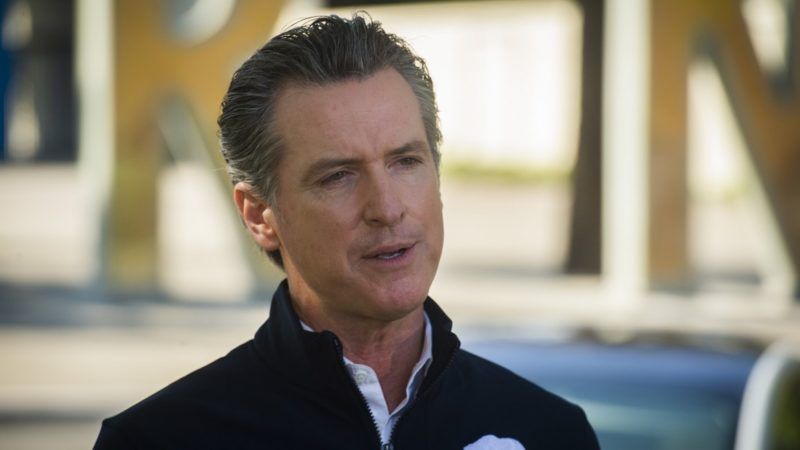Newsom Attempts To Mandate Full Transition to Electric Cars by 2035
Maybe California will figure out how to keep the lights on by then.

California Gov. Gavin Newsom wants to end the sale of all gas-powered vehicles in California by 2035.
Apparently, Newsom is attempting to implement his own Green New Deal via executive order. He announced this plan Wednesday and released an order to phase out all in-state sales of gas-powered passenger vehicles by 2035, with a goal of 2045 for complete adoption of zero-emissions work vehicles.
Newsom's own announcement attempts to cast his order as, well, an order to the California Air Resources Board requiring it to end to all these sales (but not the ownership and use of gas vehicles) in 15 years.
But the actual text of the executive order shows that it's really just a wish list of what Newsom hopes will be feasible in 15 years. The order says it's a "goal," not a mandate, and requires that California Air Resources Board regulations be "consistent with state and federal law" to work toward this goal.
And that means Newsom isn't using this vague five-page memo to seize control over the state's entire car and fuel market. It's a bunch of calls for state agencies to create a "development strategy" for achieving these goals.
So how achievable is it? According to data from the U.S. Department of Energy, there were approximately 256,800 electric vehicles registered in California in 2018. According to InsideEVs, electric and hybrid vehicles comprise less than 14 percent of California's vehicle market share. The latest data about electric or plug-in vehicles in California shows that there have been 670,000 cars sold within the state total by the end of 2019.
California has a population of 40 million people living in 11.5 million households. While California has seen a high adoption rate of electric vehicles compared to all other states, it's still remarkably low. And keep in mind, this is with thousands of dollars of federal and state subsidies for the leasing and purchasing of electric vehicles.
As technological innovation continues, no doubt the adoption of electric vehicles will improve and the cost of owning and operating an electric vehicle will come down. But the current data shows that state leadership attempting to force adoption while threatening to prohibit fossil fuel-powered cars is a bad idea.
As it stands, California struggles each summer to keep the power grid operating. Electric cars use as much power each day as an average home. Try to imagine if California had millions of electric cars this summer while the state was implementing rolling blackouts on its hottest days. Under current adoption rates, the state projects that electric cars will consume 5.4 percent of the state's electricity by 2030. Newsom wants this to be much higher.
Amazingly, the other part of Newsom's order will actually make mass adoption of electric vehicles even harder by making energy less affordable. For instance, the order calls on lawmakers to ban fracking. California has about 650 fracking wells out of nearly 57,000 active oil and natural gas wells. The state has actually issued 50 new fracking permits this year.
Why is California issuing fracking permits as the governor calls for the entire industry to be banned? Because California still depends on fossil fuels for a significant amount of power. Even with some large wind and solar farms, its many, many natural gas-fired plants are vital to keeping the lights on.
Clearly, California needs fracking energy, and the people who work in that industry need their jobs. The state cannot currently abandon fossil fuels as an energy source and also pursue greater adoption of electric-powered vehicles. Perhaps it would work as a long-term goal if California were truly serious about using powerful non-fossil fuel sources that actually could replace the state's existing plants—like nuclear energy.
Instead, Newsom is proposing the kind of green energy program that, here in California, often serves as a transfer of tax money from the poor to the wealthy. Newsom can say in his executive order that he wants "broad accessibility for all Californians" to electric cars, but as Steven Greenhut noted in July, a study determined that California's energy policies "have been found to disproportionately benefit wealthier individuals." They're the ones who can afford the cars and the solar panels. The state's poor are those who have to live under the burden of California's disproportionately higher energy costs.
Amazingly, Newsom's grand plan is under attack by environmentalists for not being grand enough, according to the Los Angeles Times. The Climate Law Institute at the Center for Biological Diversity is mad that the state continues to approve permits for gas and oil drilling and is threatening to sue unless he halts all new permits.
There's nothing in Newsom's executive order that will actually lower the cost or energy or transportation in the Golden State. Newsom also certainly knows this, because he acknowledges and emphasizes that people will still be able to drive gas-fueled cars in California. He just wants to make it impossible to buy them here.
If California attempts to force this mandate into action, does anybody care to make any bets on car dealerships popping up in the tiny three-casino community of Primm, Nevada, just across the California border on the way from Los Angeles to Las Vegas?


Show Comments (169)